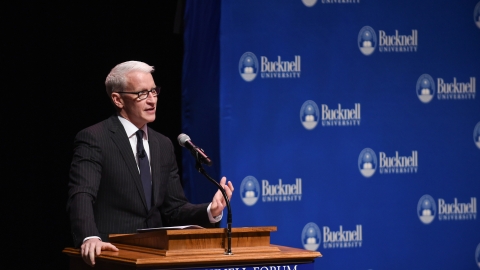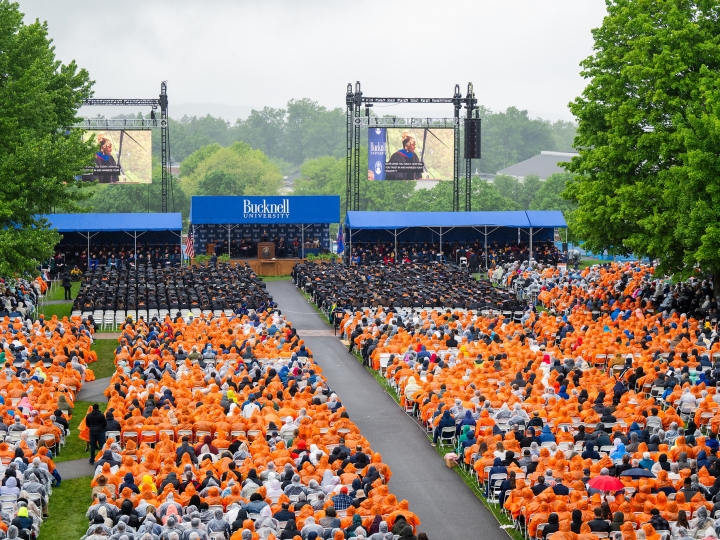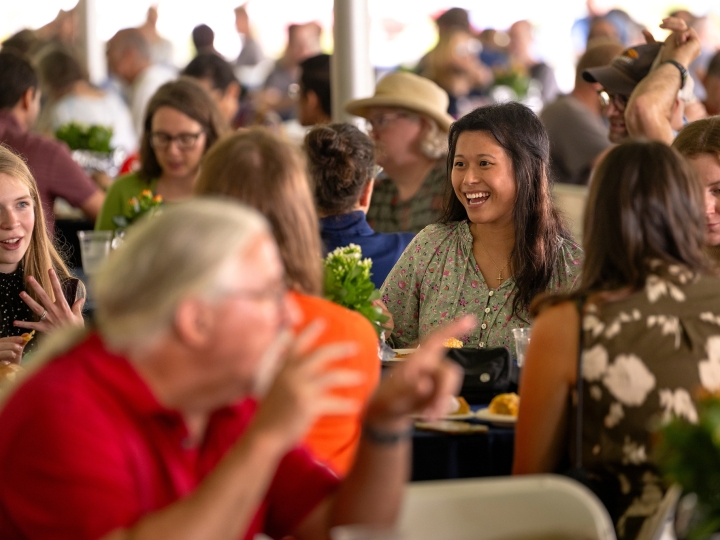
No Alternative to Facts, Anderson Cooper Tells Bucknell
February 1, 2017
Anderson Cooper spoke at Bucknell University's Weis Center for the Performing Arts as part of the University's The Bucknell Forum series on Tuesday night.
Facts matter, journalist Anderson Cooper told a capacity crowd at Bucknell University's Weis Center for the Performing Arts and there's no alternative to the truth.
Speaking Jan. 31 to a crowd of nearly 1,200 as part of the Bucknell Forum speaker series, the CNN anchor and CBS News correspondent riffed on Donald Trump senior adviser Kellyanne Conway's quip that the administration would present "alternative facts" to counter evidence that attendance at Trump's inauguration was sparser than at the 2009 swearing-in of Barack Obama.
"When you have an administration — any administration, Republican or Democrat — which thinks there are things called alternate facts, it's the role of reporters to push back on that and to do that aggressively," Cooper said. "I believe that there are facts — there are things which are demonstrably true."
A journalist in the classical mold, Cooper said his job is to provide viewers with accurate information that empowers them to make up their own minds and for that reason he keeps his own opinions close to his chest.
The majority of the hour-long forum took the form of a question-and-answer session moderated by Provost Barbara Altmann, in which Cooper fielded questions asked by audience members or submitted via email by viewers watching the event from three overflow rooms. Audience members frequently quizzed Cooper about his own opinions on the 2016 presidential campaign and the whirlwind tone of Trump's first 11 days in office, but the journalist demurred. It's not his place to share his political views publicly, he said.
"I think you should not be doing any reporting based on your own personal politics or your own personal beliefs," Cooper said. "I think you should be rigorous in combating bias. You should be rigorous in examining your own beliefs and your own actions and how that affects your reporting."
He also expressed a skeptical view of "access journalism," noting that he does not attend off-the-record events at the White House and left the only White House Correspondents' Dinner he ever attended vowing to never return.
"I've never been someone who really cares about access to a president — I think it's more important to have a confrontational relationship," Cooper said. "I don't want to be socializing with these people. I don't want to know them as individuals. I don't want to be friends with them. ... My job is to ask them questions."
From Grief to Optimism
But that intentional detachment doesn't mean Cooper isn't affected by his work. Correctly sensing that the audience would mainly question him about the current political landscape, Cooper began the forum by sharing his path to becoming one of the world's most prominent journalists, beginning with his early career as a war correspondent. It was a hole in his own heart left by his brother's suicide during Cooper's senior year of college, he said, that first led Cooper to chase conflict around the globe.
"In many ways it was my own grief that led me to want to go overseas and be around other people who were experiencing loss," Cooper said. "I wanted to in fact go to places where the language of loss was spoken, where life and death wasn't something that people feared talking about or whispered about, but was something that people faced every day and that was talked about openly. ... I found that I needed to be around other people who were grieving, who were experiencing loss. And that helped me make sense of my own story."
Cooper has borne witness to many horrors in his 25 years as a news correspondent, from the deaths of children due to starvation or the lack of cheap and ubiquitous medications, to a brutal genocide carried out by neighbors in Rwanda, to the aftermath of crushing natural disasters in Haiti and Japan. But he said he has also found inspiration in "the things you see in the dwindling light of day when everything else is stripped away."
"When you go to war, when you go to disasters, you expect to see darkness, but you also find light," Cooper said. "You expect to see horror, but you discover humanity as well."
Informed by those experiences, Cooper said he sees many reasons to be optimistic about the future. While he fielded questions about the many challenges and uncertainties brought to light in the current political climate in America — including the effect of "fake news" spread on social media sites and the Trump administration's frequent attacks on the media and CNN in particular — Cooper reminded the crowd that in the grand sense there is still no greater time to be alive than today.
While wars continue, around the world human beings are safer and living longer and healthier lives, he said. Extreme poverty has declined drastically, even in the last three decades and every day, Cooper added, the number of people living in extreme poverty drops by 250,000 around the globe.
"All of us may not feel like the world is a better place today than it was in the past, but that's just because we're more aware of what's happening than ever before — we see it," he said. "What really gives me hope, besides the advancement around the world of technology, is the power of the individual. The power that each of you in this room has to reach out and to care for somebody else."

